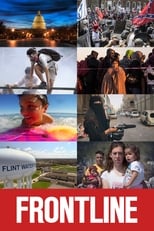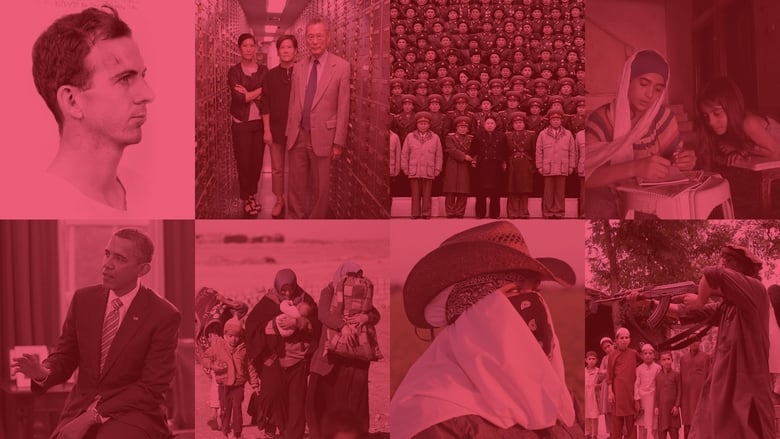
First Aired: January 17th, 1983
Status: Continuing
Network: PBS
Summary: Since it began in 1983, Frontline has been airing public-affairs documentaries that explore a wide scope of the complex human experience. Frontline's goal is to extend the impact of the documentary beyond its initial broadcast by serving as a catalyst for change.
Next Episode:
New episode date is not available for now
Episode Statistics:
# of Episodes: 1756
# of Episodes I watched: 0
# of Episodes I haven't watched: 1756
Last Episode I watched: -
Episode Summaries
Select Season:
My Season Progress:
0 %
Season 1984
Episode 1: Crisis at General Hospital
Air Date: January 16th, 1984
Summary: Most Americans regard health care as a social responsibility undertaken for the common good. We assume government and charity programs will allow for everyone with serious health problems-no matter how poor-to be provided treatment. Frontline examines how many investor-owned, for-profit hospital chains are aggressively marketing themselves to treat only the insured, or wealthy patient.
Episode 2: We are Driven
Air Date: January 23rd, 1984
Summary: The industrial might of Japan has taken the U.S. by storm as American corporations begin to adopt the Japanese style of management, stressing worker involvement in a family-like corporate environment. Frontline looks at the darker side of Japanese labor relations through the tough management style of the Nissan Motor Company in Japan and Smyrna, Tennessee.
Episode 3: The Old Man and the Gun
Air Date: February 6th, 1984
Summary: Frontline looks at the conflict in Northern Ireland through the eyes of Irish Americans who support the IRA and its strategy of violence. Frontline cameras follow Michael Flannery through his day as Grand Marshal of New York City's St. Patrick's Day Parade and then back to Ireland to the spot where Flannery participated in an ambush on British troops some 50 years ago.
Episode 4: Give Me That Big Time Religion
Air Date: February 13rd, 1984
Summary: Television evangelist Jimmy Swaggart's weekly ministry was seen by over two million people in big cities and small towns across the U.S. and Canada. But of the tens of millions of dollars he raised through his appeals, only a tiny portion actually went into charity work. Several years before his fall, Frontline investigated whether the money these modern revivalists raise goes to do God's work or to keep the preachers on TV. Should the government regulate religious fundraising?
Episode 5: The Campaign for Page One
Air Date: February 27th, 1984
Summary: On the eve of the 1984 New Hampshire primary, Frontline presents the first of four national election reports. Correspondent Richard Reeves takes a behind-the-scenes look at the presidential candidates and the political reporters who cover them, examining the story behind the story and who writes it.
Episode 6: The Mind of a Murderer (1)
Air Date: March 19th, 1984
Summary: A terrifying look into the mind of mass murderer Kenneth Bianchi, who killed two women in Bellingham, Washington, and was one of the Hillside Strangler murderers in Los Angeles. Yet, he almost escaped punishment for these crimes because he convinced a group of experts that he had multiple personalities and was not mentally competent to stand trial.
Episode 7: The Mind of a Murderer (2)
Air Date: March 26th, 1984
Summary: Part 2 raises serious questions about the use of psychiatric evidence in criminal proceedings. Kenneth Bianchi convinced experts that he had multiple personalities and was mentally unfit to stand trial for his crimes. Before Frontline cameras, Bianchi is unmasked and is proved to be an accomplished faker.
Episode 8: The Struggle for Birmingham
Air Date: April 2nd, 1984
Summary: This special election report focuses on Birmingham, Alabama, which was a key battlefield in the black struggle for civil rights in the 1960's. Now, 20 years later, Birmingham is one of the new battlefields for a mature black political movement. Frontline correspondent Richard Reeves examines black political power today and the struggle for the heart and soul of the black voter.
Episode 9: Captive in El Salvador
Air Date: April 16th, 1984
Summary: Much of the debate over the role of the U.S. in Central America focuses on this tiny nation about which filmmaker Ofra Bikel says 'we know so much, but we know so little.' In this report, Bikel takes us into the heart of El Salvador to examine the politics and the people the U.S. government supports there.
Episode 10: Chasing the Basketball Dream
Air Date: April 23rd, 1984
Summary: Many young men, especially many poor blacks in the nation's cities, dream of making it big by playing basketball. Charlie Cobb looks at some who make it-and many who will not-and at many of the issues in high school and college sports today. College recruiters seek the best of them, promising an educations in exchange for play. But 75% never get a college degree because, as this film suggests, colleges are too busy with their big-time sports programs to be concerned with educating their players.
Episode 11: The Other Side of the Track
Air Date: May 7th, 1984
Summary: Horse-racing is American's number one spectator sport. In 1982, more that 77 million people wagered almost $12 billion at the nation's racetracks. Frontline gives an insider's look at the 'sport of kings,' focusing on tracks at Belmont, NY, where the rich indulge their interest in racing, and at Great Barrington in Massachusetts where infirm horses run for purses that can barely pay the feed bill.
Episode 12: Return of the Great White Fleet
Air Date: May 14th, 1984
Summary: Frontline profiles Navy Secretary John Lehman and the growing debate inside the Navy establishment to build a multibillion dollar fleet which critics say may not be able to fight the kind of wars the nation would be most likely to fight.
Episode 13: Warning from Gangland
Air Date: May 21st, 1984
Summary: In 1984, Los Angeles had the worst gang problem in the nation, and more than 1,000 people were killed in gang violence during the previous three years. More than half of those killed were not gang members but residents who were murdered or were caught in the cross fire of gang warfare. Frontline explores what LA is trying to do about its gang problem.
Episode 14: Bread, Butter and Politics
Air Date: June 4th, 1984
Summary: National attention has focused on hunger in America after a presidential commission and several private advocacy groups reported new findings. Frontline looks at what those commissions saw-and did not see-in this examination of both the human story and the political environment surrounding the issue of hunger.
Episode 15: Man's Best Friends
Air Date: June 18th, 1984
Summary: Frontline examines the ethical arguments over the use of animal testing in American laboratories, hospitals, and medical schools. Some animal rights groups have even broken into labs to steal research animals. But many scientists say that eliminating or severely restricting animal testing means an end to medical progress.
Episode 16: So You Want to Be President
Air Date: October 9th, 1984
Summary: From the lonely, early days of presidential ambition, through the months of promise, to the day of denial, Frontline follows the 1984 presidential campaign of Gary Hart, revealing presidential politics as it has never before been seen on television.
Episode 18: Not One of the Boys
Air Date: October 23rd, 1984
Summary: As more women are voting and running for elected office, have the changed the face of American politics? Through the eyes of women as different as UN Ambassador Jeane Kirkpatrick and vice presidential nominee Geraldine Ferraro, correspondent Judy Woodruff looks at women and politics in 1984.
Episode 19: Living Below the Line
Air Date: October 30th, 1984
Summary: It could never happen to you. One day it happened to Farrell Stallings. After 28 years at the same job, he was laid off-a victim of the recession. Now he's broke, afraid, and at the mercy of the welfare system. Frontline follows him into the maze of the bureaucracy.
Episode 20: The Arab and the Israeli
Air Date: November 13rd, 1984
Summary: Two men, a Palestinian and an Israeli, born thirty miles apart, journey to America. In synagogues and universities, on television talk shows and interviews, they try to project a message - that a solution for the West Bank is possible.
Episode 21: Better Off Dead?
Air Date: November 20th, 1984
Summary: Frontline goes inside the hospitals where every day doctors, lawyers, and parents face the agonizing choice - how far do we go with medical treatment for infants born so physically and mentally damaged that they have no hope of leading normal lives? Several intimate case histories are examined, as are the politics of recent legal decisions and government rules relating to the medical care for critically ill babies.
Episode 22: Cry, Ethiopia, Cry
Air Date: November 27th, 1984
Summary: In one of the first comprehensive reports broadcast in the U.S., Frontline presents the searing reality of the famine in Ethiopia. In desert camps described as 'the closest thing to hell on earth,' nearly 100 children, old people, and the infirm were dying every day. They were dying while the US and the Soviet Union argued over how to feed them and what to do about Ethiopia.
Episode 23: Red Star Over Khyber
Air Date: December 11st, 1984
Summary: In 1979, the Soviet Union invaded Afghanistan. On the fifth anniversary of the invasion, Frontline correspondent Richard Reeves reports from Afghanistan and Pakistan, examining the stalemate in the Persian Gulf and the pressure placed on Pakistan to accept over one million Afghan refugees.
Episode 24: Marshall High Fights Back
Air Date: December 18th, 1984
Summary: Marshall High School is one of the poorest in Chicago-both academically and economically. But it is fighting back, trying desperately to upgrade academic standards and to make a difference in the lives of it students. Frontline looks at the struggle to salvage Marshall High and the lessons this school has for a nation trying to improve its public schools.
Episode 25: Marshall High Fights Back
Air Date: December 18th, 1984
Summary: Marshall High School is one of the poorest in Chicago-both academically and economically. But it is fighting back, trying desperately to upgrade academic standards and to make a difference in the lives of it students. Frontline looks at the struggle to salvage Marshall High and the lessons this school has for a nation trying to improve its public schools.
Information about series and episodes are provided by TMDB API. If you think that episode information is wrong or missing, please click here to request an update. After your request, update process can take up to 30 minutes.

